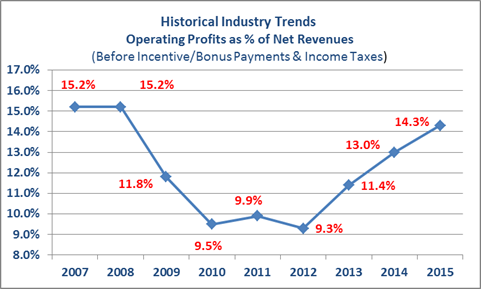Median A/E firm operating profit margins on net revenue (before incentive/bonus payments and taxes) have been on a steady rise in recent years, reaching a six-year high of 14.3% this year, according to business consulting firm PSMJ Resources’ 2015 A/E Financial Performance Benchmark Survey Report.
After posting all-time highs in 2007 and remaining stable in 2008, profit margins started to decline significantly beginning in 2009, due to the severe downturn in the economy. But, median profit margins on net revenue have been on the upswing in the past three years, hitting 11.4% and 13.0% in the 2013 and 2014 surveys, respectively—which, along with the 2015 data, supports the notion that backlogs are filling back up.

“It is certainly encouraging to see profit margins trending upward. But, there is another side to this coin. Just because the median has reached 14.3%, that doesn’t mean it should be an acceptable profit margin at all for an A/E firm,” says Frank A. Stasiowski, FAIA, Founder and CEO of PSMJ Resources. “There are plenty of A/E firms that can and do deliver profit margins far higher than this. These are the firm leaders who are able to really think differently—about project delivery, about marketing strategy, about value. Deliver a higher value and you can command higher fees…and yield higher profits.”
With data from 328 A/E firms across the United States and Canada, the 2015 PSMJ A/E Financial Performance Benchmark Survey Report is the go-to industry resource for firms wanting to increase cash flow, lower overhead, and improve overall financial results. Now in its 35th edition, the comprehensive report provides the most valuable research and insight available for making critical decisions that impact the success of a firm.
Related Stories
Engineers | Mar 8, 2016
New Toronto office is Thornton Tomasetti's first in Canada
The global engineering firm already has a history of working with Canadian architects and developers.
Architects | Feb 24, 2016
Is the booming freelance economy a threat to AEC firms?
By shifting the work (and revenue) to freelancers, “platform capitalism” startups have taken considerable market share from traditional businesses.
Reconstruction & Renovation | Jan 29, 2016
Understanding the value of physical due diligence
Physical inspections can range widely by discipline, level of detail, and the resulting deliverable, leaving even seasoned industry veterans unsure of when assessments make sense. Wiss, Janney, Elstner’s Ross Smith sheds light on building condition assessments.
| Jan 28, 2016
AIA CES class: The rainscreen approach to a better building envelope
Building envelope expert Bradley Carmichael of Hoffmann Architects explains how rainscreen wall systems work and evaluates the effectiveness of various rain-control methods, including mass walls, perfect barriers, and masonry veneers. This AIA/CES class is worth 1.0 learning unit.
Architects | Jan 28, 2016
2015 was a record year for mergers and acquisitions in the AE industry [infographic]
Consulting firm Morrissey Goodale tracked a record 234 sales of U.S.-based A/E firms last year.
| Jan 14, 2016
How to succeed with EIFS: exterior insulation and finish systems
This AIA CES Discovery course discusses the six elements of an EIFS wall assembly; common EIFS failures and how to prevent them; and EIFS and sustainability.
Market Data | Jan 13, 2016
Morgan Stanley bucks gloom and doom, thinks U.S. economy has legs through 2020
Strong job growth and dwindling consumer debt give rise to hope.
Market Data | Jan 5, 2016
Majority of AEC firms saw growth in 2015, remain optimistic for 2016: BD+C survey
By all indications, 2015 was another solid year for U.S. architecture, engineering, and construction firms.
Architects | Jan 5, 2016
Potential vs. credential: How men and women differ in career progress
Recent research suggests that women face yet another career impediment: the confidence gap.
Industry Research | Dec 8, 2015
AEC leaders say the 'talent wars' are heating up: BD+C exclusive survey
A new survey from Building Design+Construction shows that U.S. architecture, engineering, and construction firms are being stymied by the shortage of experienced design and construction professionals and project managers.







![2015 was a record year for mergers and acquisitions in the AE industry [infographic] 2015 was a record year for mergers and acquisitions in the AE industry [infographic]](/sites/default/files/styles/list_big/public/Screen%20Shot%202016-01-28%20at%209.38.08%20AM.png?itok=udg8OToR)









